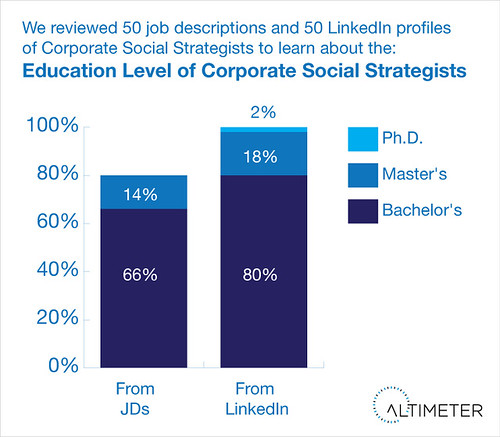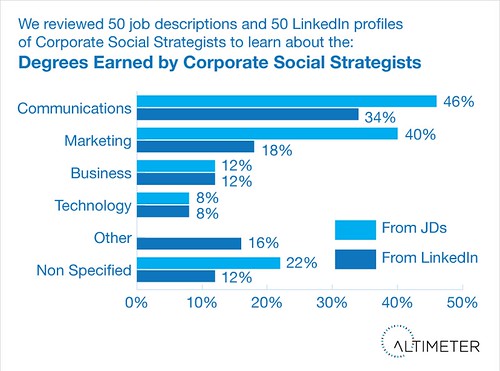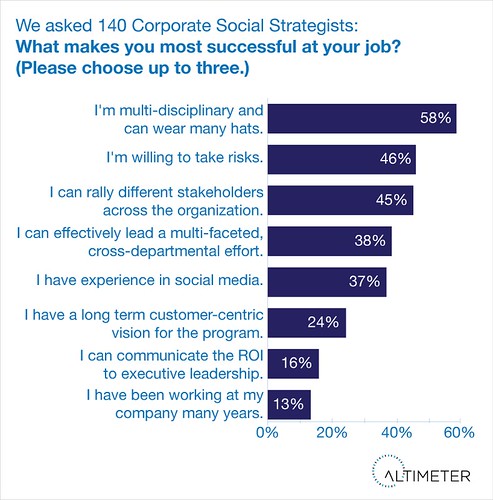The following data and insights is just a subset from Altimeter’s recent in-depth report on the primary business decision maker in large corporations, please read the “Career Path of the Corporate Social Strategist” (Open Research) first. You’ll find the report is filled with data around job titles, duration in role, department, responsibilities, challenges and aspirations. Next, you can see the actual list of these strategists segmented by industry, and then see how hiring has changed in the “On the Move” series. Many years ago, (now I sound old) I had this role at Hitachi, before Facebook and Twitter were viable options.
To better understand this role, let’s focus in on once piece of the data: their educational background. We analyzed 50 job desscriptions to find out what they wanted, and then also matched 50 job descriptions of actual corporate social strategists to find out what they had. For the most part it lined up pretty well with education requirements. Here’s the findings of their background and make-up:

Finding: All of the Corporate Social Strategists sampled had bachelors degrees –exceeding the requirements from the 50 posted job descriptions (Source: 50 job descriptions and 50 LinkedIn profiles, 2010)

Finding: Of the degrees achieved, most were focused on communications related degrees, quickly followed by marketing. (Source: 50 LinkedIn profiles, 2010)

Finding: These professionals are a jack of all trades, willing to take calculated risks, and works well with others in other departments (Source: 140 survey respondents, 2010)
A New Profession, Rooted in Communications, Prepares for a Risky, Cross-Functional Role
In the full report (here’s the link again), we know that most have been working for just over a decade, most are in marketing or corporate communications, the data on their background matches this nicely.
- For today, Communications and Marketing are ideal education backgrounds for social business. his group was more educated than the job requirements were listed by the hiring companies. All of the those we surveyed had an undergrad, and a handful having advanced degrees (18% had Master degrees) and one respondent had a Ph.D. It makes sense that the first role to be severely impacted by social was corporate communications, as the influence flow from bloggers and customers caused a serious disruption from 2005-2008 with mainstream media picking up these stories and amplifying them. When we modeled the data, we included degrees in English, Journalism, Communications into that first line item.
- Yet expect over time the degrees to shift out to a wider segment. While the corporate social strategist is often the leading the ‘hub’ within the company, I expect this to shift to a stand-alone social media group, and then strategists to appear at the ‘spokes’ starting with support, then product, and then into regional areas. When the role starts to permeate beyond marketing and communications, expect a new class of degree requirements to appear.
- Not For The Timid: Be Prepared to be Flexible and Willing to Stick Your Head Out. No doubt, this individual is leading change management within the status quo culture within a corporation, we call these individuals ‘Open Leaders’ who are willing to give up control to gain more influence. These professionals must be proficient in a number of skills such as communication, education, persuading, knowing technology, crises management, and program management. Additionally, because they are changing ‘the way things have always been done’ they must be willing to take risks, and work with stakeholders across the entire company.
For Those Seeking a Job in Social Business
Our 2011 social business forecast data indicates that corporations will spend their largest line item on staffing up the social business team, so if you’re seeking a role during a recession, there may be opportunities for you. In the past we’ve seen some real scrutiny placed on the journalism and communications practice, and I’m here to tell you that the data supports that the innovative practitioners have already adapted these new technologies and there are some ripe opportunities. If you’re a student now that is studying communications and marketing (or a professor guiding them), I’d love to hear your thoughts below in the comments. If you’re teaching in these courses, please feel free to use our research reports under the Creative Commons licensing that we specified in the report –it’s intended to share with attribution. Also to keep some perspective, while the Corporate Social Strategist may be the leadership position, there are many other roles in the team, as we’ve started to explore in this Quora thread, also see Focus.com, which has a B2B slant where I posed the same questions.
Thanks Jeremiah for this analysis! It provides very good insights into the world of work for corporate social strategists and the level of importance organisations attach to social engagement
I feel so defined here 😀
Great post with some outstanding charts. I’d argue that adding some basic graphic design and/or programming skills to your repertoire is a must for anyone considering this career path. In my opinion, such skills would fall in the “many hats” category making you that much more attractive as a candidate. B2B is so far behind the curve when it comes to utilizing social and new media. Adding a Social Strategist will help, but for many organizations it’s hard to justify dedicated head-count to a position like this. The more responsibility you can take on the better!
Great post with some outstanding charts. I’d argue that adding some basic graphic design and/or programming skills to your repertoire is a must for anyone considering this career path. In my opinion, such skills would fall in the “many hats” category making you that much more attractive as a candidate. B2B is so far behind the curve when it comes to utilizing social and new media. Adding a Social Strategist will help, but for many organizations it’s hard to justify dedicated head-count to a position like this. The more responsibility you can take on the better!
Jeremiah, I think there are two tiers of understanding and leveraging social media. Superficially, marketers can learn the ins and outs of Facebook, Twitter, etc. and create strategies for capitalizing on them for current revenue gain. On a higher (and perhaps more important, long-term level), emerging technology strategists monitor, track and position organizations to capitalize on emerging trends (social media being just one) based on deep understanding of internet technology trends past, present, and future. That being said, corporations might be well-served to look for futurists, visionaries, and big-picture strategists who monitor and understand the gravity of technology trends. I can see how entrepreneurial-minded employees with advanced business and internet technology degrees and experience might be the most sought-after in organizations looking to differentiate themselves from competitors now and into the future.